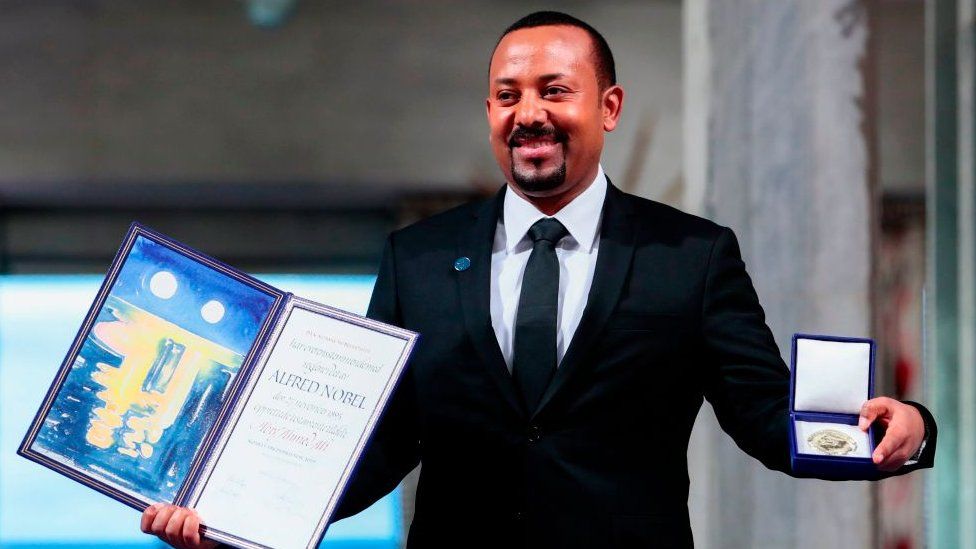ABIY AHMED ON THE RACK
By Femi Olugbile
How time flies.
It was only a few short months ago that this column was celebrating Prime Minister Abiy Ahmed as a shining bright new light on the generally dim African leadership firmament. He was a man who had become Prime Minister of Ethiopia, the grand old African nation, at the relatively young age of forty-one. Within a few short months in power, his message and his body language had convinced the generality of his countrymen, and even normally skeptical observers from outside, that something new and refreshingly different was afoot.
With a few crisp gestures, including a visit to Asmara, the capital of neighbouring Eritrea, he signed a deal that brought an immediate end to one of Africa’s longest and most pointless wars.
People who have a worry about Africa’s tardy pace of development have always recognized that internecine conflicts, many of them with historical roots stretching back into antiquity, are among the major drainpipes sapping the energy of the continent. The war between poor ‘Marxist’ Eritrea and its bigger, equally poor neighbour Ethiopia was one of those conflicts about which many had developed a weary sense of futility, resigning themselves to the possibility that they could go on forever.
The whole world immediately took notice of Abiy Ahmed.
The Nobel Committee in Norway took notice too, awarding him the Nobel Peace Prize in 2019.
It felt refreshingly different to be able to celebrate something good and important coming out of Africa.
Abiy’s impact was not just about the war in Eritrea. He was pushing to change Ethiopia on the ground. Ethiopia, despite being an ancient Empire with antecedents dating back to biblical times, and despite being a nation with a proud history of not having been subservient to colonial rule, is a multi-ethnic federation with strong Christian and Muslim traditions rooted in antiquity. The Ethiopian monarchy, according to Oral History, arose from a union between King Solomon and the Queen of Sheba. Emperor Haile Selassie was overthrown in 1974 by a leftist group known as the Derg under Mengistu Haile Mariam. After a protracted civil war, the Derg was overthrown by the Ethiopian People’s Revolutionary Democratic Front (EPRDF), a coalition of ethnic-based groups led by the Tigre People’s Liberation Front (TPLF) in 1991.
From then on, an authoritarian regime in an inequitable ‘federal’ system was in place, with allegations of domination by the Tigrayans, and claims of marginalization from others among the eighty ethnic groups in the nation, including the majority Oromos.
This was the context of in which Abiy Ahmed, an Oromo, was promoted from within the ranks of the EPRDF to the position of Prime Minister in 2018.
Abiy cultivated an image of a unifying leader who was eager to build bridges across the several fracture lines of his country. He went round the country with a passionate message of unity. He strove to convince the people that he was embarking on a process of building a just, transparent, and egalitarian Ethiopia. He promoted more women into visible public positions. He spoke across the religious divide between the Christian majority and the Muslim minority. He appealed to the young and ambitious.
A personality cult of sorts developed around him, especially in Addis Ababa. Breaking with the past, he moved to disband the EPRDF and formed a new political group, the Prosperity Party, which he encouraged people to join. Ominously, the previously dominant TPLF declined to join the new group, and instead withdrew its energies to its homeland in the Tigre Province.
Abiy released thousands of political prisoners and invited opposition figures who had fled into exile to return home.
A disturbing undercurrent of socio-political unrest continued in the country. Some prominent political figures were assassinated in public. Low-current insurgencies there and there led the country to accumulate two million internally displaced citizens within its borders.
And then all hell broke loose was when the government of the Tigray Province, led by Abiy’s erstwhile allies the TPLF, decided to go ahead with scheduled elections in the middle of the COVID19 pandemic and a national shut-down, and defied a direct instruction from the federal government to postpone the election. Seeing a ‘real and present’ danger in the open defiance of his authority, Abiy Ahmed decided to move against the government of Tigray. It was a declaration of Civil War.
Hindsight, as they say, is ‘20-20’. Should Abiy have stepped back to reconsider? Was it his pride, or the requirement to preserve the authority of his office, and the integrity of the ‘federal’ Republic? Did the people in the provinces have a right to self-determination? Would it always require a strong centre and an iron fist to maintain the unity of the Republic, even if some people wanted out?
Despite a massive win in an election that eventually took place a few months ago, and several African leaders turning up to celebrate Abiy’s inauguration as the properly elected Prime Minister of Ethiopia, it has been disaster after disaster lately. A nasty civil war in Tigray, with documentation of widespread atrocities on both sides. The TPLF beating back the government troops, and now standing poised to invade Addis Ababa itself with their allies. Eritrean troops joining government troops in the fighting and killing fellow Ethiopians. Tribal ‘nationalistic’ rallies in Addis Ababa stirring up paranoia. Rumours of arrest and detention of Tigrayans in the capital.
This was not what Abiy set out to do, surely! This is the opposite of the script that endeared the handsome young African leader to his countrymen and to millions of Africans as a shining new light. Some people are even calling for a withdrawal of his Nobel Prize, as a man now associated with a conflict redolent with internationally actionable War Crimes. Can Abiy rescue himself?
Can he be rescued?
Or is the history of African leadership locked into a repeating cycle of failure and self-defeating overreach?
Hmmmm.

